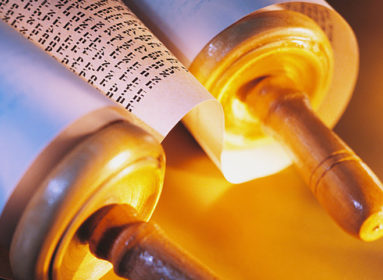By Rabbi Shlomo Riskin ~
The Book of Exodus takes us from the foundations of a family in Genesis to the development of a nation. Ironically, the first time the children of Israel are referred to as a nation is after the family of Jacob arrives in Egypt and became “numerous and powerful” there (Exodus 1:9). The segue between the books is the towering persona of Joseph, to whom Genesis devotes 13 chapters (Jacob only merits 10-and-a-half). Is it not odd that Joseph, who is called ha’tzaddik (the righteous one) by our sages, is not deemed worthy of being the fourth patriarch? Furthermore, what is there about Moses that causes him to be singled out by God as the savior of Israel?
Let us begin with Joseph. I believe he merits the appellation “tzaddik” because, as a stranger in a strange land, he nevertheless resists the seduction of Potiphiar’s wife and refrains from committing adultery (Genesis 39:7-12). However, he still cannot be counted as one of the
patriarchs. God promises Abraham, the first patriarch, the legacy of a nation, guaranteeing him eternal “seed” who will eventually live within the borders of
Israel. Joseph, from his teenage years, when he dreamt of sheaves of grain, hankered after the lush agricultural prosperity of Egypt rather than the more arid grazing lands of Judea.
But there is an even more powerful reason for Joseph’s exclusion. The Abrahamic covenant is predicated upon the principle that every human being is
created in the image of God (Genesis 1:26,27). It is this axiom that makes every person inviolable and free – ideas that are developed in the Exodus from Egypt and the commandments given at Sinai.
This is why God chose and loved Abraham, “since he will command his children to guard the way of the Lord to do compassionate righteousness and moral justice” (Genesis 18:19).
Enslaving a human being is the antithesis of compassionate righteousness and moral justice. Through Abraham “all the families of the earth are to be blessed” (Genesis 12:3), but Joseph’s economic policies by which he enslaved the entire Egyptian populace to Pharaoh – who owned them and their lands – and resettled them wherever he wanted in Egypt, was directly contrary to the Abrahamic obligation (Genesis 47:18-27).
The Hebrews, who were shepherds rather than landowners, were exempt from the enslavement, as well as re-settlement (Exodus 47:27).
I suggest that the subsequent enslavement of the Hebrews by a Pharaoh “who did not know Joseph” was a divine punishment of those whose ancestenslaved all of Egypt. In his cavalier and degrading treatment of the Egyptians, Joseph had turned away from the Abrahamic covenant.
Moses is the mirror-image of Joseph – if Joseph was the family member who yearned for the greener pastures of Egypt, Moses was the prince of the Court of Pharaoh who identified with and reached out to his enslaved brethren (Exodus 2:11). Much more than that, “he saw [va’yar] their burdened pains, and saw [va’yar] an Egyptian man smiting a Hebrew man from among his brothers” (ibid).
The Hebrew word va’yar means to see suffering and to do something for the victim. This is the meaning of the verse in the Scroll of Esther, “How so would I be able to see [the same verb as in va’yar, v’ra’iti] the evil which has befallen my nation [and not act to prevent it], how would I be able to see [the same verb] the evil which has befallen my nation [and not act to prevent it], how would I be able to see the destruction of my birthplace [without attempting to forestall its occurrence]” (Scroll of Esther 8:6). Likewise, this is the only way to understand the conclusion of the Grace After Meals, “I was young and I also grew old, and I never saw a righteous person forsaken, or his children scrounging for bread – [without attempting to help them].”
Hence, the very next verse records, “And [Moses] slew the Egyptian and hid [his corpse] in the sand” (Exodus 2:12). When the oppressor is about to murder the oppressed, when the master is about to smite the slave, then the only correct expression of “compassionate righteousness and moral justice” is to slay the oppressor-master.
Moses, in acting in the way of ethical monotheism, in identifying with the Hebrews and in attempting to spark the rebellion which would eventually free them and take them to the Promised Land, is the “repair” for the “Egyptianization” of Joseph.
Moses our teacher is the proper covenantal continuation of Jacob.
Rabbi Tzvi Hersh Weinreb is executive vice president emeritus of the Orthodox Union (OU).








 Southern New England Jewish Ledger
Southern New England Jewish Ledger









